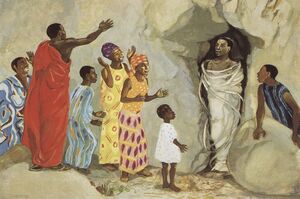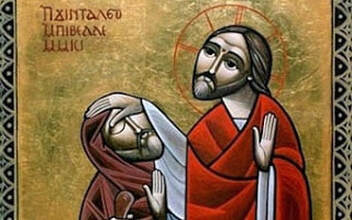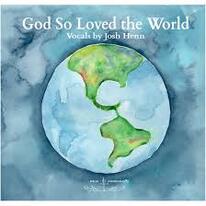
These days, we are surrounded by death. Social media is quick to keep us up to date on the latest casualties. The rise in the peak of death due to Covid-19. Accidents on the freeway. Lives claimed by cancer. What was your first encounter with death?
When I was 14, I witnessed my brother die from a combination of alcohol and sleeping pills. He didn’t really want to die. He just didn’t know how to live. This was not death buffered by a funeral home, but in-your-face death – a vivid presence of death, at home in the living room, where you can feel life dwindling, leaving gray-blue cold skin in its wake. Just like the Presence hovering over Ezekiel’s valley of bones. Like the Presence enveloping mourners weeping at the tomb of Lazarus.
The topic of death, even for church-goers, people who believe in God and struggle to follow Jesus, is difficult to engage even as we trust in divine mercy. Who would go around talking about death? Who wants to be around someone talking about death?
So, we push death away. We have become successful: we live in an era that has seen the average life expectancy jump from 46 years to almost 79 years in just over one century. In our battle against death we have discovered vaccinations, procedures, surgeries and treatments, diets that have prolonged life considerably. Yet are we better prepared to deal with death? Are you? Am I? Can we ever be?
Dealing with death is hard, but, then, dealing with life can be just as hard and painful. People live in ugly, unjust ways. People live alone and unloved. People live with bitterness, anger and resentments, consumed by fear. Life wounds us in ways that are hard to recover from. We entomb life and joy. Neither life nor death are for the weak of heart. We must come to terms with life as we must come to terms with death.
We see an intimate portrait of death in our scriptures today. These lessons demand we contemplate the broad face of death. In the gospel of John, we view a death that comes to a small village, a single family. Death that is fresh, raw, stinking and has a name, Lazareth. There is weeping and wailing. There are all those futile questions and comments: “Lord if you had only been here…” Why did you delay, Jesus?” If only I had done this… If only I had encouraged her more If only I had called….why didn’t I see the signs? Could not he who opened the eyes of the blind man have kept this man from dying? Where were you when I needed you God? Why didn’t you come sooner? Why, Why, Why?
The horror of communal death illustrated by Ezekiel in his vision of the valley of dry bones. Bones, bones, for as far as you can see. Death that is out in the open. Death comes to a people, community, nation. In his vision of rebuke and warning, death has been a way of life for so long it no longer stinks. Flesh is gone. Sinew is gone. The Spirit is gone. There are no mourners, instead of weeping and wailing there is utter stillness and silence in the Valley. Just death, alone.
Our Bible lessons don’t explain death, even as we, as do thoughtful people, seek answers in the face of this devastation. But our texts do invite us in, to sit in the valley or by the tomb. By keeping faithful company with death, we are promised by God that we come to know the Lord.
So, we sit today at the tomb and the valley of death. The Spirit of this presence speaks to us. We learn about sorrow, unfinished business and broken dreams. We come to see more clearly the source of our suffering, the true “dis-“ease. It is the lack of love and loss of love connection. Our hearts are broken by chronic isolation, love loss in our guilt, shame and despair.
Death is not the problem. Life is not the problem. The problem is the conditions we place on love.
Jesus wept after he showed up in Bethany. When Jesus first received word that his friend Lazarus was ill, he had just had a hostile encounter with some religious leaders. They were ready to stone and kill him. Jesus had to flee to safety. By responding to the call of Mary and Martha, Jesus placed himself at great peril. He returned to the territory where his enemies were planning to do away with him. As Jesus stood before the grave of Lazarus, calling him back to life, Jesus was signing his own death warrant. At the conclusion to Chapter 11, we read that the chief priests and Pharisees called a council to terminate Jesus once and for all. Jesus would soon be exchanging places with Lazarus in the tomb. We see love in action, in death, in life.
As holy week draws near, our texts prepare us for this mystery of love and death, suffering and sacrifice, mercy and resurrection. The Love that breathes on the bones and restores life. It is Love that opens graves. Shatters tombs. Love is present, unfelt, unsummoned, even when we are at our lowest. That is the sacred mystery we will encounter This Holy Week, this Easter, even in isolation, even in quarantine, even in the storm of Coronavirus pandemic, God’s Presence, God’s love finds us, calls us, summons the flesh back on our bones.
So, Love, through Jesus’ sacrificial death on the cross for us on Good Friday, asks us: how do we really experience God? Is Love just a quaint title we give God that has a nice ring to it? Only death can make us sit and realize this is not an intellectual exercise. Death is not an abstract experience. And neither is God. Unless we have been restored to life by God while alive that we can have no idea what Jesus means when he calls himself the Resurrection and the life.
Life and death are not the problem. It is whether we chose to love in life and death that makes all the difference. So, sit in the valley. Sit by the tomb. Shed those tears. Rage if you must. Seek out Jesus, who has come to awaken us. Jesus is the Resurrection and Life and points the way to God’s glory – made manifest. Let uss rise from death to new life as we witness Jesus suffer, die and rise. May we, encounter in our final week of Lent as we journey to the cross, in he shadow of death may know the stirring, hovering, enveloping presence of Life. Amen.



 RSS Feed
RSS Feed